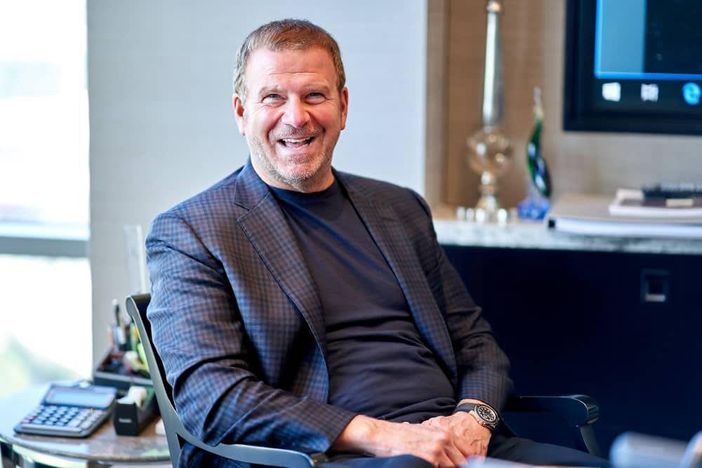10 Houston billionaires make Forbes' list of richest Americans in 2025
The Rich List
America's wealthiest billionaires are $1.2 trillion richer in 2025, bringing their collective worth to a staggering $6.6 trillion. And Houston's own Richard Kinder has become the richest billionaire in the city, according to the new Forbes 400.
The Kinder Morgan chairman is the 11th richest Texas resident and ranks as the 108th richest American. Kinder also dethroned Tilman Fertitta to claim the title as the wealthiest Houstonian.
The annual Forbes 400 list is a definitive ranking of the wealthiest Americans, using interviews, financial data, and documentation provided by billionaires and their companies.
Kinder's wealth
The publication estimates Kinder's net worth at $10.6 billion, up from $8.1 billion last year. He also appears among Forbes' separate list of the richest billionaires in the world.
"It’s been a year unlike any we’ve seen in the four decades we’ve tracked America’s billionaire class,” said Forbes senior editor Chase Peterson-Withorn in a press release. "The super-rich at the very top are richer than ever — and between the White House and the booming stock market, they’re as powerful as they’ve ever been."
Kinder, 80, co-founded oil and gas pipeline firm Kinder Morgan in 1997, which is now known as one of the largest American energy infrastructure companies. He stepped down as CEO in 2015, though he still chairs the board of directors.
Kinder and his wife, Nancy, also founded Houston-based nonprofit the Kinder Foundation in 1997. The organization provides "major gifts to public causes with the intention of helping people realize healthy and rewarding lives," according to its website.
In May 2025, the Kinders pledged $150 million to Texas Children's Hospital and MD Anderson to create the Kinder Children's Cancer Center.
"Our philanthropic efforts center on supporting transformational projects in Houston, and this initiative exemplifies that mission in every way," said Kinder in a press release. "We were deeply impressed by the extraordinary leadership and unwavering commitment of both UT MD Anderson and Texas Children’s to pursue a bold, collaborative model of care. It is a rare and powerful moment when two leading organizations come together to create something entirely new – something capable of reshaping the future of pediatric cancer care."
The richest Houstonians
In all, 43 Texas billionaires made it on the 2025 Forbes 400 list, and 10 are based in the Houston metro.
Hospitality honcho Fertitta, 68, is the second-richest billionaire in Houston, and his net worth has jumped from $10.1 billion last year to $11 billion in 2025. He owns the Golden Nugget Casinos, the Houston Rockets, Texas-based restaurant and entertainment company Landry's, and also serves as the U.S. Ambassador to Italy.
"Serving as President Trump's ambassador to Italy 'is a real job,' says Fertitta, who personally oversaw the renovation of Villa Taverna, the ambassador's residence in Rome," Forbes wrote in his profile.
Fertitta most recently put his ritzy 250-foot-long superyacht on the market for about $192 million, with Forbes saying he "has a bigger one on order."
Here's how the rest of Houston's billionaires fared on this year's list:
- Oil tycoon Jeffery Hildebrand ties for No. 123 nationally with an estimated net worth of $10 billion. Last year: $7.6 billion.
- Toyota mega-dealer Dan Friedkin ranks 128th nationally with an estimated net worth of $9.7 billion. Last year: $7.6 billion.
- Houston pipeline heir Randa Duncan Williams ranks 130th with an estimated net worth of $9.5 billion. Fellow pipeline heirs Dannine Avara and Milane Frantz tie for 135th nationally. Each has an estimated net worth of $9.4 billion. Scott Duncan ranks No. 141 with a $9.2 billion estimated net worth.
- Houston Texans owner Janice McNair ranks 201st nationally with an estimated net worth of $7.3 billion. Last year: $6.2 billion.
- Energy exploration chief exec George Bishop of The Woodlands ranks No. 325 with an estimated net worth of $4.7 billion. Last year: $5 billion.
Richest billionaires elsewhere in Texas
The richest person in America in 2025 is none other than Austin-based Elon Musk. Musk, 54, saw his net worth skyrocket to $428 billion this year, or $184 billion more than his 2024 net worth. He claimed the No. 1 spot for the fourth time.
Walmart heiress Alice Walton of Fort Worth was dubbed the wealthiest woman in America for 2025. Walton, 75, simultaneously holds the title as the richest woman in the world. Forbes estimates Walton's net worth at $106 billion (up from $89.2 billion last year) and proclaims her as the first female centibillionaire (a person with a 12-digit fortune) in America. Now that's wealth.
"Tariffs. Inflation. Slowing employment. None of it has hit the fortunes of America’s billionaires," Forbes said. "A decade ago, when it took $1.7 billion to make The Forbes 400, a net worth of $3.8 billion was comfortably within the top half of the ranking — now that lofty sum is the minimum required."
---
This article originally appeared on CultureMap.com.

